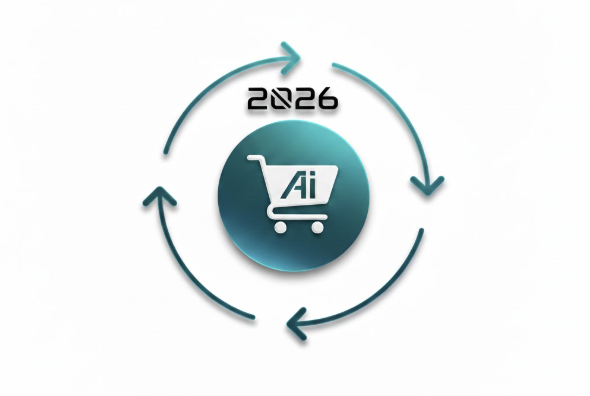Partner Spotlight: Andrea Carver Smith

Who is Andrea Carver Smith?
I am a Technology and Ecommerce Executive specializing in digital transformation and infrastructure, with a focus on technology shifts and emerging trends — from mobile apps to generative AI. With Product Management as my foundation, I’ve grown into leadership roles that help companies at various stages reach their next level of growth — from tech startups like AllPosters and Phunware to global ecommerce brands such as Sephora and Tatcha.
I’ve recently pivoted into Digital Consulting to leverage my experience in helping brands achieve their strategic goals. What I love most about this work is stepping inside different businesses — learning how they operate, what makes them unique, and how different digital solutions can help them grow.
When you first started exploring the agentic commerce space, what surprised you most about who the early players are — and where the real innovation is happening?
I wasn’t surprised by who the early players are, but I was surprised by where the innovation is coming from — and the speed at which it’s happening. Competition and experimentation are emerging across a wide range of consumer touchpoints: browsers, mobile apps and phone integrations, ecommerce checkout, enterprise workflows, and developer ecosystems. We’re still in the ‘test and learn’ phase, and I suspect the major platforms are exploring the full range of possibilities before narrowing their focus and going deep.
How do you define “agentic commerce” in simple terms for brands who may still be thinking in terms of traditional e-commerce or D2C?
Broadly speaking, agentic commerce is the use of AI agents to perform shopping tasks on behalf of users. These agents can research, compare, negotiate, complete purchases, track orders and process returns — all with minimal human involvement. For brands, success will depend on being able to communicate effectively with both audiences: people and the AI agents acting on their behalf.
Many beauty and retail brands still prioritize Amazon or Sephora over their own D2C sites. What risks do they run if they don’t start building their own agentic experiences now?
Today, AI platforms primarily crawl or scrape websites to gather product information and generate shopping results. In the near future, however, these platforms will rely on brand-owned AI agents (feeds & APIs) to supply richer, real-time data — from product details and inventory to customer insights, brand voice, and loyalty programs.
Brands that don’t start building these agentic capabilities now risk being ranked lower or excluded entirely from AI-driven discovery and commerce experiences. It’s no longer just about optimizing for search — it’s about preparing your brand to be understood and represented by AI. The real conversation isn’t if to invest in brand agents, but how deeply to integrate them and what level of data sharing makes sense for the brand and the consumer.
From your consulting work so far, what do you see as the biggest barrier for established brands in adopting agentic commerce — technology, mindset, or structure?
From my experience, it’s less about mindset and more about barriers in technology and team structure.
On the technology side, the biggest challenges are roadmap prioritization and investment in new technology development. The space is evolving so rapidly that brands must build and iterate even as technical standards are still taking shape. That’s a tough balance for organizations used to more defined frameworks and proven ROI models.
Structurally, agentic commerce represents a fundamental shift — from managing websites to managing ecosystems. Roles that once focused on optimizing human interactions will now need to optimize machine-mediated ones, ensuring brand data, voice, and value are understood by both customers and their AI agents. A few of the most common role shifts:
- Digital Marketing/ SEO Teams → AEO / LLMO Specialists
- Ecommerce Merchandising → Data Experience Managers
- Customer Service → Human-Agent Interaction Designers
- Leadership → Agentic Strategy & Governance
- Product Management → Agent Ecosystem Strategists
- Engineering & Data → Agent Infrastructure Architects
For established brands, adapting these structures — and rethinking where to invest — will be key to building sustainable advantage in the agentic era.
What would a great agentic experience look like for a beauty consumer — say, discovering or buying a skincare product — a year or two from now?
In the next year or two, beauty shopping will feel effortless and personal. Instead of searching websites, consumers will rely on AI agents that know their skin tone, preferences, and budget. These agents will compare products, check real-time inventory, apply loyalty rewards, and coordinate with brand agents — handling everything from discovery to delivery.
I think the ultimate consumer experience will unlock when an agent understands what level of involvement the consumer wants in any given scenario.
For products I already love — say, a favorite skincare item — the ideal experience is effortless. My agent would reorder before I run out, find the best price, and have it delivered to my door. It would flag relevant updates, too: a new travel size, a limited-edition set, a formula change, or a BOGO offer.
But when it comes to new or complex purchases, the experience becomes more collaborative. If I’m exploring a product for a specific skincare concern or learning about a new launch, I’d want my agent to do the research — surfacing unbiased reviews, before-and-afters, price comparisons, expert opinions, and even “try-before-you-buy” options. Then it would summarize what it finds, learn from my reactions, and refine its recommendations until we make a confident decision together.
From there, the agent would handle the follow-through — tracking shipping, managing returns, even posting reviews — so I stay informed without having to manage the details myself.
The magic of agentic commerce isn’t just automation; it’s adaptive engagement — knowing when to take the reins and when to bring the consumer back into the conversation.
For people just starting to explore this field, what’s one misconception about agentic commerce you’d like to clear up?
There are a few misconceptions that often come up in early conversations about agentic commerce:
1. “Agentic commerce is replacing brand sites.”
Not quite. Agentic commerce isn’t making brand sites obsolete — it’s redefining their purpose. Rather than being the primary destination for human shoppers, brand sites will evolve into data-rich sources of truth that power interactions between consumers, agents, and platforms. The role of a brand’s digital presence is shifting from being the storefront to fueling the ecosystem — ensuring content, product data, and brand values are legible and compelling to both humans and AI agents. Brands that embrace this early — structuring their data, clarifying their voice, and connecting their systems — will remain discoverable and preferred in an agent-first world.
2. “Brands can wait until the technology matures.”
Many established brands are taking a “wait and see” approach, but the technology is moving fast — with OpenAI, Perplexity, Gemini, and other platforms releasing new capabilities constantly. By the time the technology stabilizes, the data ecosystems, ranking systems, and AI-driven checkout capabilities will already be in place. Brands that haven’t built their own agentic infrastructure — or made their data and content readable by AI agents — risk being invisible when consumers shift to agent-driven discovery. The groundwork needs to start now.

Other Insights

Insights with Ajinkya (Jinx) Joglekar

The Financial Inevitability of Custom AI Models

The Ecommerce Reset: What Matters Going Into 2026
See Envive
in action
Let’s unlock its full potential — together.





